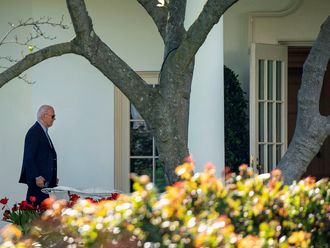Mexico City: It doesn’t matter how many time officials tell voters that Sunday’s presidential vote will be honest: most Mexicans are convinced that a fraud is being cooked up.
“There is going to be fraud because that’s our system of government,” said David, who spoke as if he were explaining how gravity works.
He’s hardly alone: 71 per cent of voters believe that voter fraud is possible, according to a survey out Friday by the National Autonomous University of Mexico (UNAM).
David, who declined to give his full name, happens to be one of five citizens at his polling station chosen at random by the Federal Electoral Institute (IFE) to monitor the vote.
“We’ll close the polls, count the votes and hand the ballot boxes over the IFE - that’s where the fraud takes place,” he said in a matter-of-fact way.
Pre-vote surveys show Enrique Pena Nieto, the handsome presidential candidate of the Institutional Revolutionary Party (PRI), with a commanding lead — suspiciously large, sceptics say — in Sunday’s vote.
The PRI ran Mexico for 71 years through a mix of patronage, selective repression, bribery, and ballot-box stuffing.
It was a well-oiled system that saved Mexico from the military coups that plagued much of Latin American. Peruvian Mario Vargas Llosa famously described it as “the perfect dictatorship”.
During the campaign Pena Nieto benefited from glowing news coverage, especially from Mexico’s de facto TV duopoly, Televisa and TV Azteca. Pena Nieto is married to a popular Televisa telenovela star, and the 45-year-old candidate can’t help if he shines next to his older, lacklustre rivals.
Many voters believe this is all too perfect to be true.
“I lived through all the worst of the PRI and witnessed their intolerance and cheating,” said Elena Perez, 61, a resident of the port city of Veracruz. “They’ll climb over their own mother to win. That’s why I believe they’ll return to power.”
Old fraud tactics included “Operation Tamale,” in which PRI voters cast multiple rolled-up pre-marked ballots; the “Pregnant Box,” ballot boxes pre-stuffed with marked votes; and the “Crazy Mouse,” in which voters cast ballots at multiple polling stations.
The most high-profile questionable election was in 1988, when leftist Cuahutemoc Cardenas was ahead when the computerised vote counting system mysteriously crashed . . . and the PRI’s Carlos Salinas was later declared president.
The IFE, an independent organisation that holds federal elections, was founded soon after to prevent a similar catastrophe.
Salinas was followed by fellow PRI member Ernesto Zedillo, but in 2000 conservative Vicente Fox with the National Action Party (PAN) was elected president, ending 71 years of PRI rule.
Critics say the hiatus lasted only six years: in 2006 leftist Manuel Lopez Obrador from the Party of the Democratic Revolution (PRD) lost the presidency to the PAN’s Felipe Calderon by a suspiciously low margin - 0.56.
Lopez Obrador screamed fraud and lead mass protests that paralysed Mexico City for more than a month. He even took oath as the “true” president of Mexico and appointed a “cabinet” of ministers.
Fearing that Lopez Obrador would again refuse to recognise a defeat, on Friday Mexico’s presidential candidates signed an agreement to respect the vote results.
New counter-measures have presumably ended the old fraud tactics, but rumour has it that some PRI candidates have ordered followers take cell phone pictures of their ballots to get a reward.
How to counter this? “Commit fraud on fraud,” the #Yosoy132 student movement proclaimed on its Facebook page. They urge those voters to take a clear plastic sheet, slip it over the ballot, mark the PRI slot, then take it off and “vote your conscience.”
Election officials have worked hard to convince skeptics that their votes will be valid.
“This will be the most observed election day in our history,” said Lorenzo Cordoba, a top official at the independent Federal Electoral Institute (IFE).
Nearly one million Mexicans — including IFE workers, volunteer citizens and party representatives — as well as 700 international observers will be at polling stations across the country to oversee the vote.
Mistrust, especially towards politicians, “forms part of the Mexicans’ DNA,” Cordoba said.
David, the citizen election monitor, is convinced that the leading parties have handed out gifts like charge cards that will be activated if the chosen candidate wins. Nevertheless he’ll take a moment to cast his own ballot.
“I still have hope that my vote will be valid,” he said.
Pre-vote surveys however show that around 40 per cent of the nearly 80 million eligible Mexican voters will not bother to show up to vote on Sunday.












